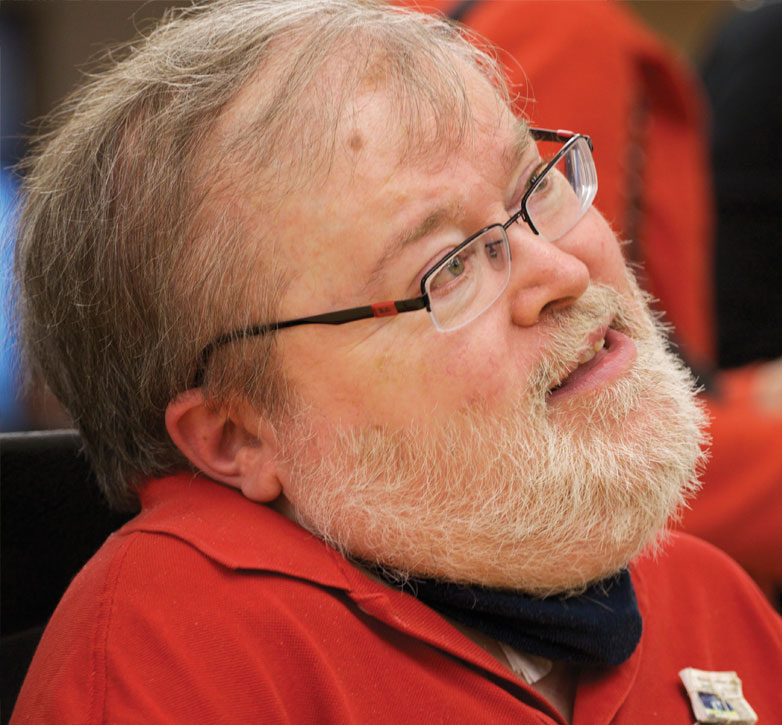By Stephen Trumper.
A case of pneumonia, ICU follies and a surprising ending
We’re sorry Mr. Trumper.”
“This should not have happened. Our apologies professor.”
In early December I spent four nights at Toronto’s St. Michael’s Hospital after having difficulties breathing. A mild case of pneumonia, it turned out but, given my lack of robust chest muscles, I had been whisked quickly to Emergency.
The chorus of apologies were not because I had pneumonia. Rather, it was because of the actions and inactions of one of the ICU night nurses. I had met her kind before.
Every so often a friend says something like: “Hospitals must be great for people with disabilities. Everything is there. All the staff must understand your needs.” Oh, I wish.
Almost 20 years ago I had been in hospital for three months, dealing with a sudden, decline of my lifelong spinal-cord malformation. Looking back, I can remember my anger over the selfishness and self-centeredness of too many nurses. I had been shocked by how many complained to me about how hard their jobs were and how much they resented the changes in healthcare. In addition, I was appalled by how they ignored me when I gave them precise instructions, or assumed I couldn’t possibly direct my own care.
Excuse me? Here I was, significantly more paralyzed than I had ever been, listening to this claptrap and enduring, in essence, whatever they saw fit to do to me. I do not like to get angry. My preference: search for the humor.
But on that recent night at St. Mike’s, the antibiotics must have momentarily killed my laughter while they busily exterminated those nasty germs.
Whenever I’m in hospital, I try to make it clear that I am particular about how I like to lay in bed, how I want the urinal positioned, how I communicate (a clicking sound with my tongue) when the speaking valve for my trach tube is out.
Then along came that night nurse in ICU. For 20 to 30 minutes midway through her shift I urgently clicked away. No response. Twice I had to use the urinal and twice she failed to notice she had not “docked” properly and my bodily fluids spilled all over me and the bed. With light of day came the realization that a bad mistake had been made, prompting an urgent cleanup in which she and another nurse abruptly moved me around despite my protests on how best to do so. Exasperated, I said none too softly, “just grab both my knees and pull them back slowly.” They grabbed my ankles. No, I said. They grabbed my calves. No, I repeated, adding in a snarky tone: “You both went to nursing school, presumably you know where the knees are.”
I was livid, pointing out to the parade of apologists who followed that the hospital spends all this time and energy monitoring me, carefully checking my medication, measuring my inputs and outputs and yet, despite all that, the entire system fails when a nurse, or two or three, or some other health professional, has an off day, or feels overburdened, or doesn’t pay attention, or is pulled in too many directions, or doesn’t understand the dynamics of disability and what it’s like to feel so vulnerable, isolated and afraid to ask for help.
Unlike my three-month hospital stay two decades ago, my overall experience this time was much better. Most, but certainly not all, the nurses were amazing (though the complainers are still with us). Thank you in particular to Robin in Emergency and Marlene in ICU. To a respiratory therapist named Ha, who took it upon herself to explain my needs to the nurses and workers on the floor I had been moved to after ICU, a lonelier floor with even less help, I will treasure you forever. As I will her colleague, Brian.
Finally, thank you to the doctors and others who listened when I announced that I would like to try to make it to my final class of semester despite being in hospital. In this case the St. Mike’s team “got” disability (that it sometimes takes extraordinary measures to live a disabled life day to day). Their response: if my breathing was enough on the upswing, they were all set to send me to Ryerson with a nurse and backup oxygen tank.
Though the breathing numbers that day weren’t good enough to venture out to my class, I was still pretty happy. I was on the mend, hospital resources had been mobilized to help, not hinder me, and several of the good folks at St. Mike’s urged me to write up my experiences so others could learn more about how best to deal with people with disabilities in a respectful, dignified way. So I did…
 Stephen Trumper serves on the board of the Canadian Abilities Foundation. He is an independent writer and editor, and is also a journalism instructor at Ryerson University
Stephen Trumper serves on the board of the Canadian Abilities Foundation. He is an independent writer and editor, and is also a journalism instructor at Ryerson University














